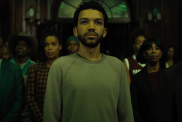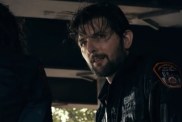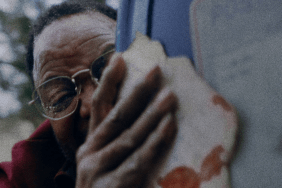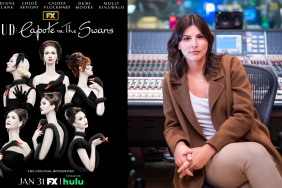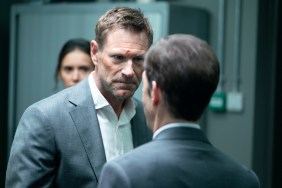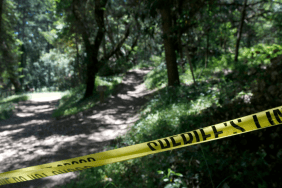Christine star on Showtime series

About two years ago, this Shock writer was able to conduct a career spanning interview with actor-turned-director Keith Gordon over on Icons Of Fright. (Check that out right here.) Genre fans of course recognize him in front of the camera for his performances in Jaws 2, John Carpenter’s Christine and Brian DePalma’s Dressed To Kill, as well as the Rodney Dangerfield comedy Back To School.
He eventually made the shift over to directing with dramas such as The Midnight Clear and Waking The Dead, but when we initially spoke, he was just tackling episodes from Showtime’s second season of Dexter.
Now, he’s directed episodes in every season and with “Lost Boys”, the 10th episode of Dexter season four debuting this Sunday, we thought this was the ideal time to catch up with him to talk about all things Dexter.
Robg.: You’ve now been able to tackle episodes in every season of Dexter since the first one. How’s the experience been for you thus far working with the crew behind the Showtime series?
Keith Gordon: It’s been great! I wouldnât have gone back eight times if this werenât true, but no one is difficult on the show. I mean, the cast, the crew, the producers, the network, everyone is delightful to work with. Iâve done eight episodes now and Iâve never heard anybody yell, Iâve never seen anybody have a hissy fit or get obnoxious. If anything comes up, people talk to each other like human beings. They try to keep the hours reasonable which is very unusual for TV. A lot of TV shows, 15-16 hour days are normal days, on Dexter those are the rare exceptions. They really donât want to do that and burn everybody out. And I love the show! I think the writingâs great. I love the idea of the show. Iâm a fan, so itâs really fun to work on something that Iâd want to watch if I wasnât working on it.
Robg.: Wasn’t this one of those cases where you reached out to Showtime about directing an episode in the beginning?
Keith: Yes, I chased them! What happened was the first year, I saw the pilot. I just thought it was the coolest thing. And I got on the phone with my agent and said âjust get me in thereâ and it turned out they had one slot left (in season one) and theyâd already been thinking of somebody, but I begged my way into doing it. [Laughs] I said, âListen. I really want to work on this show. I think itâs the coolest thing on TV. Itâs completely my sensibility.â
Robg.: That was the second to last episode in the first season too.
Keith: Yeah, and it was as much fun as I hoped it would be. Luckily they were happy with me that they kept asking me back and itâs continued to be a really positive experience. Each one is different but theyâre always interesting. Iâve learned a lot as a director as well. Thereâs something about doing TV where I also feel like Iâm learning things, Iâm trying things, because they have certain stylistic things, Iâm doing things differently then Iâd instinctually do, which is good for me. Itâs great to be challenged. Itâs great to go âOk, Iâd play this in a wide shot, but they really want it in a close up.â How do I get what I want but still make them happy? Itâs been a really good ride.
Robg.: For you personally, since youâve worked on every season, howâs the dynamic changed from season to season with the actors, with the producers and crew? Is it just a tighter machine from season to season?
Keith: It goes through ups and downs in terms of the tightness of the machine, because people come and go. Within the crew often, up until this point, none of the key people have left. Now this season is the last year for the gaffer on the show. People donât think a person like a gaffer is important, but this guy has been amazing. Heâs helped us light quickly every year and helped us get the great look for the show. While weâre doing one scene, heâs pre-lighting the next scene. He works very closely with Romero Tirone, the Director of Photography. So if heâs not there next year, I wonder if itâs going to change how way things work. Usually towards the end of the season, everyone leaves to go work on the next show. So there are often new faces. The cast stays the same and theyâve all been really great to work with and I think it starts with Michael (C. Hall). He really establishes the tone. The star of anything really establishes the tone for something, and Michael is so calm and so centered and focused that I think everyone else goes with that. You canât be a diva when the starâs not being a diva. Michael is easy and there and into trying things, so for someone else to act up would be incredibly embarrassing. The whole cast, theyâre all different personalities, but all great. Michaelâs very shy and introverted, focused. David Zayas (Angel Batista) is very fun and extroverted. But I can honestly say thereâs not one person amongst the cast I donât like. Everyone likes being directed, which is fun for me as a director. Everybody in this cast, if I challenge them and say, âweâre got to try a take like thisâ, they all light up if I have a different idea. I love working with Jennifer (Carpenter). Sheâs really responsive and willing to try things. Thatâs true of everyone on the show. Even the guest stars too. They cast it really well, people like John Lithgow and Keith Carradine and Jimmy Smits. Theyâve all been of that spirit, where they want to try different things. So as a director, itâs fun because you actually get to direct. And Iâve been on TV shows where you donât get to direct. They want you to shut up and not do anything.
Robg.: Starting with the most recent season, youâve gotten to work with John Lithgow. As a director on the show, youâre the one element thatâs interchangeable. Do they keep you in the dark about whatâs going to happen later in the season while youâre doing your episode?

Keith: They do a little bit, and thatâs weird. They did it more this year and Iâm hoping they wonât do it next year. What I think happened, generally the security level went up this year. Like last year, I had people shadowing me, young directors who wanted to learn would follow me around and take notes. Visitors came to the set more, but this year none of that was allowed. They kept things much more under wraps and I think thatâs because the producers were not too happy with how many plot twists got out last season for season three. Frankly, I donât think it has anything to do with what goes on on the set. I think that has more to do with people that work at the network, because the scripts go through a million hands. The editing goes through a bunch of editing houses. I donât know that itâs the people on the set that are blabberingâ¦
Robg.: Well, as a fan of the show, I purposely avoid spoilers. I donât want to know what happens! I want to be surprised when it airs.
Keith: Well one of the things thatâs funny is a lot of them are wrong too. Iâve gone on IMDB and read the spoilers and Iâd think “well that one they actually knew something, these other five are totally not true.” Itâs a little frustrating, because there were a couple of things they didnât tell me this year that I really shouldâve known because I wouldâve directed things differently. And again, theyâre trying to walk a fine line so I understand. There was one instance where John Lithgow had to come to me and say âListen, the reason Iâm doing this is because in three episodes Iâm going to do this.â And I thought âOh!â Because he was being resistant about my direction for my first episode this season with him, and finally he took me aside and said âthis is why Iâm not going there. Iâm not trying to be difficult. This is whatâs going to happen in a few episodes.â And I thought Oh my God, of course. Now I get completely what youâre doing and youâre right. What’s fun is I literally do not know how this season ends, which is really trippy. Iâll be just as excited as everybody else watching that last episode. Iâm as excited as any fan because I donât know whatâs going to happen!
Robg: Your next episode airs this Sunday, “Lost Boys”?
Keith: Yes, I did the tenth episode which is about to air and that was a blast because it was really a roller coaster ride, especially after all the reveals of last episode. The whole thing was moving, moving, moving with a lot of energy, so that was a fun one to direct.
Robg.: The story arc for this season has been amazing and Iâve been shocked how theyâre handling the Trinity killer this season thus far.
Keith: True. Thatâs what they really like doing in the show. They like complexity. They like making characters that are multi-layered and have contradictions. In anything, whether its movies or TV or literature, things that are always filled with contradictions are always the interesting ones. Itâs conflict. They get that because theyâre good writers on Dexter and theyâve got a great writing staff. One of the other things thatâll be interesting next year is that Clyde Phillips is leaving the show. He was the showrunner since the beginning and thatâs obviously going to affect the show. He just wants to get back to living with his family at this point because they live on the East Coast and I completely understand that.
Robg.: Do they shoot the show in LA? I always thought it was Florida.
Keith: They do shoot it in LA. They do get stuff in Miami, stock footage. They’ve run around town with a camera to get skyline shots and shots of Michael driving his car, stuff like that. In the editing process as much as possible, I love to integrate those shots because it gives it a real sense of truth. But itâs amazing, we shoot lot of it in Long Beach because of the exteriors and you can fake Miami amazingly well in Long Beach. There are times where weâll go from an actual wide establishing shot in Miami to a less wide shot in Long Beach and you just wouldâve know the difference. So thatâs actually a fun thing in editing is to go through their stock of stuff. The interiors are all sets that theyâve built over at Gower Studios.
Robg.: How far ahead are they in terms of plotting what theyâre doing in future seasons? Because at the beginning of season three, theyâd announced a season four and five. So are they thinking about the next season during this one?

Keith: As a director, Iâm not in the writers room so Iâm not involved with that process as much. To be honest, my sense of it is that theyâre really focused on the year that theyâre working on. It doesnât mean theyâre not toying with some ideas for the next year. It doesnât mean they havenât had general conversations about themes they want to explore or start setting up this year, but I feel thereâs so much work in telling a story this intricate each year, and they have a bunch of great writers focused on getting each story done, so I donât think thereâs a lot of pre-conceiving done for next year. They probably have ideas for new story arcs, but not anything too far ahead. In the writers room, thereâs this big board for the current season with all the story arcs mapped out. I think they get together very early per season and get their work together.
Robg.: Whatâs great is they limit it to 12 episodes per season, which is perfect because it doesnât leave room for a âfillerâ episode.
Keith: Thereâs no way you can maintain that kind of complexity with more than that. Some of the best shows keep it at 12. The Wire was 12. The Sopranos tended to be somewhere in that episode range. That tends to be a real healthy number. Beyond that, you start padding things out, burning out the cast and crew and overdoing it. Thatâs a real good manageable number to keep the stories tight and focused.
Robg.: Some of the things I like about your episodes and I guess this is a stylistic thing, but I can always tell when itâs one of your episodes because of certain things you do. Itâs something you do in your movies too, but youâre really good at capturing what I consider intimate awkward moments. Perfect example, in the second season, the first date that Deborah has with Lundy, itâs just one of those natural moments when heâs cooking for her in the kitchen and then slaps her bottom and grabs her. Itâs kinda hot! You captured that nervous flirtation between these two characters who obviously like each other. I donât see that very often on television.
Keith: I love those scenes and itâs funny you say that because those are some of my favorite scenes to direct. Give me two good actors in a room and I can play a little bit, and I can get them to play a bit. Especially something like the scene you mentioned. One of the things they donât like you to do in TV is improvise, which is frustrating because I love doing that in my features. Even if I wrote the script, I like letting actors play. I try to get a real improvisational feel in terms of the blocking , so even if theyâre sticking to their lines, we can do something. Sometimes even in rehearsal Iâll say, donât worry too much about the lines, letâs get the feeling down first. When we shot that scene, most of which is in one shot, it was different each time and I encouraged them that way. The way that Keith would grab Jennifer was different each time and the way the kiss went was different each time. That was basically my direction to them was to keep playing. âDonât do that again. Weâve got that. Letâs try something else.â I kept reminding them itâs the first time again. Youâre both nervous, youâre both excited, youâre both hot for each other. You donât know whatâs going to happen. Sometimes Iâd give one direction but not the other. Iâd say to Keith âgrab her a little bit earlier and kiss her harder. Try to catch Jennifer off guard.â Itâs not big dramatic things, itâs those little things, just to keep the other actor off balance. Itâs so easy when youâre shooting a TV show this fast to fall into a rhythm. I find the best scenes are when you get out of the rhythm. I was really proud of Jennifer in “Dirty Harry”, episode five of season four where she had the breakdown in the parking lot while talking to Dexter. She just completely falls apart. It was a scene sheâd been nervous about and it was about saying let go of all your previous ideas and let it happen. Those scenes, again two people, great actors that could do that. When you get someone like Michael and John Lithgow in a room, anything can happen. Theyâre really creative, wonderful actors. So even if your time is limited, you never know what that scene is going to be like. Everybody just stops to watch and gets really into it. If I have a strength as a director, itâs trying to keep that energy up and try something different.
Robg.: I always wondered, how do you handle Dexter‘s narration on set? Is it pre-recorded and played on set while Michael acts out the scene?
Keith: No, when we film it on set, there’s no narration. Michael often does it on his own. While Iâm working on one episode, he goes into his trailer with a high end recorder and does the narration. He does it so well and nails it. Heâll often do it out loud during rehearsals just to time it in his head and so I know if we need to move the camera, where I should be ending. Heâs such a technically precise actor, if he does the narration and itâs going to be about eight seconds, you can be sure heâs going to act out the scene and have it be eight seconds. I do get to hear it before we shoot it and we talk about it, but heâs got a really good idea of what that voice will be. Heâs such a good actor that I can watch his face and tell when the end of his narration is. The quality of it is something he just nails.
Robg.: Speaking of the narration, I love that moment in season two when Lundy is interrogating him and thereâs a bit of humor in the way he reacts to Lundy trying to catch him off balance with the animal crackers bit.
Keith: That was the eighth episode of season two and again that was a case of two great actors in a room and because it was eight pages and I knew weâd have plenty of time to shoot it. I had time to let Keith and Michael play with each other there. There was one cut where Michael was acting really cool and he accidentally knocks over Lundyâs tea cup, and it spilled on the desk and they both kept playing with that. I thought it showed Dexter’s nervousness under this cool front, and I loved it and ultimately they didnât use that take, but I thought it was one of those cool little accidents that happens sometimes.
Robg.: You also did The Dark Defender episode from season two and got to fulfill your superhero homage.
Keith: That was a blast! The black and white thing was something I was so glad they let me do!
Robg.: How was it written? Did you get leeway on how to represent âthe Dark Defenderâ?
Keith: I donât remember, but it wasnât literally written out. But I did talk to the writers about the comic book feel and having it not feel so naturalistic. He helped me get the mood of what he wanted. We went with that grainy black and white, which the producers let me do. They were like âOh, that seems cool. Sure, try it!â Thatâs whatâs cool about working on a show like Dexter, they often get turned on by an idea like that instead of turning it down. Michael did such a great job and thatâs an example of where heâs fabulous, you donât even have to tell him what to do for those types of scenes. Look at him in that scene, his body language, the way he pushes back the cape and wraps it behind him and then gallantly picks up his mother. Even his voice is different and deeper. I didnât tell him to do those things, I knew how good he was and that he was going to come up with stuff, so basically my job there was to encourage him. Michaelâs always so full of ideas and naturally creative that heâs going to come in and give you wonderful stuff to work with. That scene was a blast. Conceptualizing it, and then seeing it in the editing room and making it cut together was great.
Robg.: I just wanted to talk a bit about Julie Benz because primarily when anyone talks about this show, they primarily concentrate on Michael C. Hall or Jennifer Carpenter. But Julie is not only an incredibly beautiful woman, but sheâs been popping up in a lot of cool movies like Rambo and Punisher: War Zone and Boondock Saints II. So, can you talk about the working relationship with her?

Keith: Like everybody on the show, sheâs easy to work with and very sweet and sheâs got a vulnerability to her that translates well into the role, which I think is very important. Because one of the things that I think you never want to lose with that character is how damaged she started. Sometimes in the writing, I feel theyâre bordering on making her too healthy. If you go back to episode one, one of the reasons Dexter fell for her was because he says âsheâs as damaged as I amâ and I think Julieâs done a good job of keeping that damaged little girl alive underneath. A woman that as a character has become a lot more confident and a lot more strong as the showâs gone along. Sheâs got that as a person, sheâs someone whoâs got that natural vulnerability. Sheâs had a hard job by keeping that broken vulnerable woman alive, while making her really strong too.
Robg.: What have been your favorite episodes? Let’s start first with your favorites as a fan?
Keith: Well, my favorite as a fan is the very first episode, the pilot I think is remarkable. It stands alone as just a great piece of filmmaking. The reality is that on a pilot you have more money and more time, they usually have more luxuries that we donât have on other episodes, but I felt the director Michael Cesta did an amazing job to create a look. The script was a wonderfully written script and you couldâve shot it very forward and in a naturalistic way, but what Michael created in that opening episode was this surreal world. He was setting up a show that was somewhat a subjective show, where someoneâs seeing Dexterâs view of the world. Weâre not just sitting back like a lot of stories allow and saying âhereâs the reality.â Weâre saying this is Dexterâs reality. And heâs an unreliable narrator. Youâve got a narrator whoâs busy saying he doesnât have any feelings yet youâre watching him in the very first episode screaming at that guy saying âLook at what youâve done!â At the same time, heâs saying he doesnât have any emotions. So, whatâs true? Directorial, Michael Cesta brilliantly complemented that in the writing. He complemented that sense of whatâs real and what isnât real? Whatâs subjective, whatâs objective? Whatâs fantasy, whatâs real? He established that in that first episode brilliantly and the rest of us have had that as a template to work off of. So I think that first episode has to get an incredible amount of credit. I also love last episode, the season finale for season one. The whole fantasy of him being a hero is so funny and tragic and so weird. I also love the episode before mine in that first year where heâs in that room of blood. Itâs like a Stanley Kubrick movie. [Laughs] Thereâs images from that that are so intense where he finally remembers what happened to him. I found that episode incredible.
Robg.: How about a favorite of the ones you’ve directed?
Keith: I have fondness for all of them but I have to say The Dark Defender episode I really do love. It was a blast to do, Iâm happy the way it came out. Iâm so happy that they payed for Gimme Shelter so that we could use it in the soundtrack!
Robg.: You also got to finish off the arc with the man who killed his mom later that season.
Keith: Yeah, and I liked doing that other episode as well, but thereâs something about that fight scene where heâs beating the hell out of the guy that killed his mother and heâs spitting blood as he talks. We shot it with that stark black background and the harsh white light. I just loved the way that worked and what the two actors did. That wasnât the Dexter weâve seen killing people, it was much more out of control and I had to push Michael to do that. I had to remind him âthis isnât the guy that does it meticulously. This is the rage underneath.â And it took a few takes to build up to where he was spitting on the guy. That was really fun to direct and Iâm really proud of it. I do love the one thatâs about to air this Sunday. Episode 10 that I did this year I like a lot. Every single character is doing something interesting and I love what every character did, what Michael did and what John did. I of course will always look fondly on the one I did first season because it was my first time. The hardest year was the third year and it was probably the least fun for me. I learned a hard lesson â which is that, it was an honor to do the opening episode and the last episode, but the problem is those are the episodes where everything is the most tense. With the network, with the producers, the pressure was on! And I felt that more. There were more compromises made in the editing because everybodyâs watching those particular episodes more closely. Those episodes ended up a lot less then what I did when I shot them. The other thing, the last episode of season three, they were changing things right up until the last minute so there was a lot of scrambling. That wasnât as much fun. They wrote themselves into a corner and they made a choice to kill their antagonist in the next to last episode last yearâ¦
Robg.: Which was shocking and surprising.
Keith: It left a last episode that was mostly cleaning up loose ends as opposed to a season finale. And the network understandably wanted it to feel more climatic. But really when Jimmy got killed it was over. It was a tough episode in that sense that we had to try to make it feel dramatic when really it was almost like it couldâve been the first episode of the fourth season. It didnât feel like an end, it felt like âwhere do we go from here?â For me itâs all about process, so the process on those two were tough. Thatâs why I asked, âCan I do a couple in the middle next season?â [Laughs] My favorites are Dark Defender and this new one.
Robg.: I loved season three but it was going to be tough to follow season two up no matter what they did for it. This new season has come close.
Keith: Season four has definitely gone up again and I agree. I donât think anybody would kill me if I said personally season three, while I think itâs great, to me was not up to the level in terms of impact and emotion and intensity as seasonâs one, two and now four. Three was a little bit of a dip, but thatâs still a pretty good batting average. I think what theyâre getting back to in season four is the complexity of Dexterâs psychology. Three shared a similar theme to two in that in season two he never had a friend and then there was Lila, and in three he never had a friend and there was Jimmy Smits. Now I think heâs questioning things on a whole level. The idea of can I be a normal person and a killer? Where does that leave me? What are my moral standards? Does Harryâs code apply to me anymore? So youâre dealing with some bigger issues in his life. Where will this take him? Can he have a family? Will this work? And those are big questions. I donât know the answers yet! I donât know where theyâre going with it yet. But seeing him grappling with âhow do I fit into the world?â goes back to season one and two more interestingly. As much as he continues to say he doesnât have feelings, and although some of the producers and writers will argue this, to me its obvious he does have feelings. Clearly he cares for that family and clearly he needs human contact. He needs love and he loves those kids. So how does he have that and be who he is? Thatâs a really good dramatic conflict. Thatâs what a lot of this season is about. Again, heâs an unreliable narrator that constantly goes on about how he doesnât have feelings, but to me I think itâs a show about a guy trying hard not to have feelings, and thatâs fascinating. Watching somebody trying not to let their feelings take control of them? What an interesting dilemma and weâve all been there in our own ways. Heâs killed someone innocent now. How will that affect him? What makes him not like John Lithgow’s Trinity? That will be interesting to explore for the remainder of this season.
Keith Gordon’s latest episode of Dexter “Lost Boys” airs this Sunday November 29th only on Showtime.
Source: Robg.

